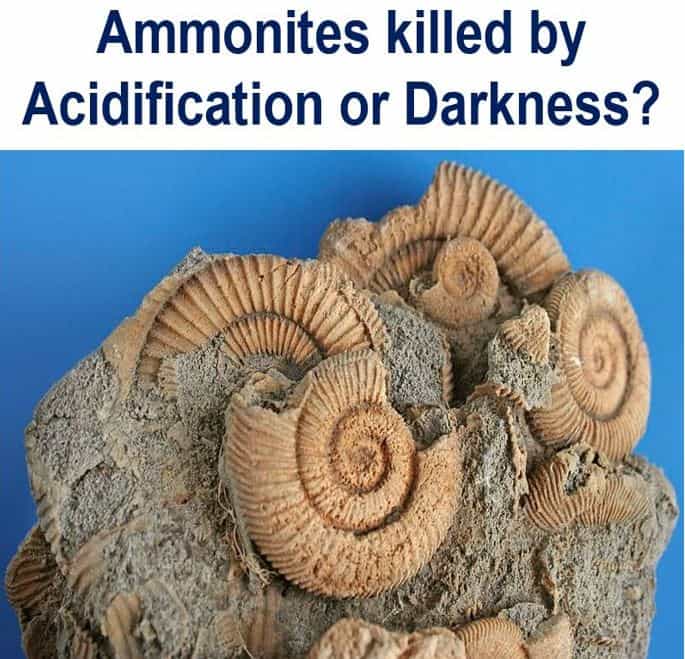The belief that ocean acidification, caused by the asteroid impact sixty-six million years ago, killed off all the ammonites, could be wrong, say scientists from the University of Southampton in England, and the Leibniz Center for Tropical Marine Ecology in Germany.
The asteroid, which crashed into the Yucatan peninsula, also caused the extinction of the dinosaurs and several other species.
The researchers wrote about their latest study in the academic journal Proceedings of the National Academy of Sciences (citation below).

If the extinction of the ammonites was not caused by ocean acidification, what caused it? Prolonged darkness? (Image: Wikimedia)
Ammonites are an extinct group of marine invertebrate animals – free-swimming mollusks – closely related to living coleoids such as squid, octopuses and cuttlefish.
Ammonites became extinct at the time of the end-Cretaceous asteroid impact, as did over 90% of species of calcium carbonate-shelled plankton (foraminifera and coccolithophores).
Scientists initially thought sea acidification was the culprit
Other comparable marine life not possessing calcium carbonate shells were not so severely affected, which led scientists to believe that ocean acidification, as a consequences of the asteroid collision, may have been the cause of the apparent selectivity of the extinctions.
Previous increases of carbon dioxide levels on Earth happened so gradually that the accompanying acidification was relatively tiny, and ammonites and other planktonic calcifiers were able to survive through the changing ocean chemistry. The asteroid collision, on the other hand, caused very sudden changes.
This is the first modelling study of ocean acidification following the asteroid collision. Co-author, Professor Toby Tyrrell, from Ocean and Earth Science, National Oceanography Centre Southampton, and colleagues simulated several acidifying mechanisms, including wildfires emitting CO2 and vaporisation of gypsum rocks leading to sulphuric (US: sulfuric) acid or ‘acid rain’ being deposited on the surface of the ocean.
Acidification not severe enough
The scientists concluded that the acidification levels produced following the asteroid impact were too weak to kill off the calcifying organisms.
Prof. Tyrrell said:
“While the consequences of the various impact mechanisms could have made the surface ocean more acidic, our results do not point to enough ocean acidification to cause global extinctions.”
“Out of several factors we considered in our model simulation, only one (sulphuric acid) could have made the surface ocean severely corrosive to calcite, but even then the amounts of sulphur required are unfeasibly large.”
“It throws up the question, if it wasn’t ocean acidification what was it?”
Possible alternatives to the creatures’ extinction include intense and prolonged darkness from soot and aerosols injected into the atmosphere. Prof. Tyrrell and team believe these alternatives should continue being investigated.
The study was funded by the UK Ocean Acidification programme, the European Project on Ocean Acidification, and NERC.
Citation: “Severity of ocean acidification following the end-Cretaceous asteroid impact,” Toby Tyrrell, Agostino Merico, and David Ian Armstrong McKay. Proceedings of the National Academy of Sciences. Published 11 May, 2015. DOI: 10.1073/pnas.1418604112.

